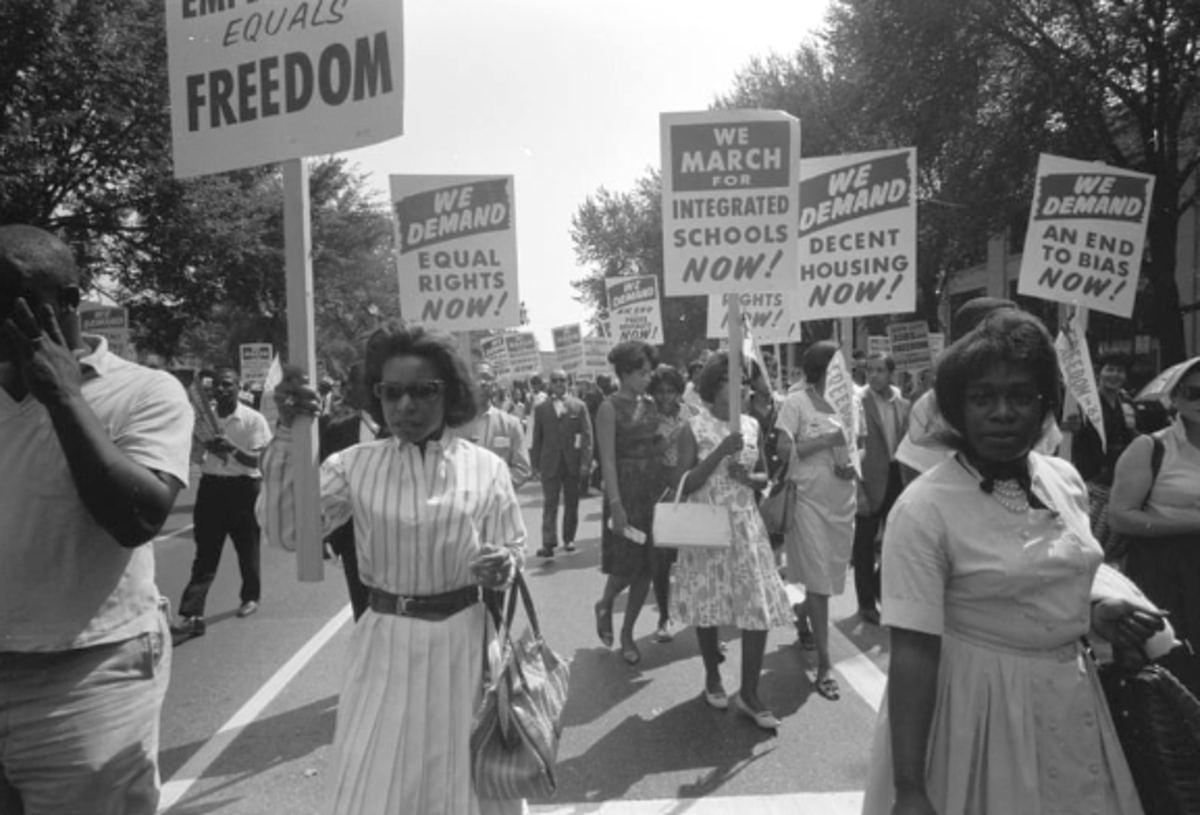Gay Equality, Homophobia, and Another Country
Gay Equality, Homophobia, and Another Country
WRITTEN ON Sunday, September 2, 2007
I am currently doing business in the UK, and am stunned by the difference between the manner in which the UK treats gay people and the manner in which the US treats gay people. Whereas gay people living in the UK receive respectful treatment and a modicum of fairness from both their government and their society, the US appears to be headed full tilt backwards with respect to this particular issue.
Here in the UK, employment and other forms of discrimination based on sexual orientation are strictly prohibited; such discrimination is treated as severely as is discrimination on the basis of race or national origin. It is considered completely unacceptable to fire a person from a job at which that person excels merely because that person is gay. Furthermore, this is not a mere government objective; this is considered to be unacceptable by the people. Gay persons living in the UK may enter into “Civil Partnerships” which are the equivalent of marriage in all but name. Whereas only one state in the US (Massachusetts) permits gay marriage, Civil Partnerships are recognized throughout the UK. Gay marriage in Massachusetts is recognized at the state level only, thereby denying to gay couples in such marriages about 1,049 federally recognized benefits and privileges enjoyed by married heterosexual couples. Civil Partnerships in the UK grant to gay couples all of the rights and privileges of marriage at all levels. Several states in the US recognize gay marriage at the state level in all but name. These relationships are referred to as “Civil Unions” in Vermont, Connecticut, New Hampshire, and New Jersey, and as “Domestic Partnerships” in California, Hawaii, and Oregon. Although there has been progress in the US (a total of about eight states now grant to gay couples the privileges and benefits of marriage at the state level), this progress has been much slower and more halting than the progress realized by gay people living in the UK. (At the time of writing this, a state court in Iowa has just handed down a decision holding that the denial of marriage licenses to gay couples is violative of the Iowa state constitution; if this decision is upheld by the Iowa Supreme Court, the State of Iowa will be forced to recognize either gay marriage itself or some form of civil union as described above.)
One reason for this is undoubtedly the lack of an organized evangelical right-wing movement here in the UK. Whereas fundamentalist “Christians” are still able to disease the cultural discourse in the US, there are far fewer people in the UK who tap into a fundamentalist Christian model and who consider it to be their duty to force their particular narrow, moralistic agenda onto the people of the UK. The full provisions of the Equality Act (Sexual Orientation) went into effect here in the UK a few months ago. Although exemptions exist for priests and ministers of religion, even religious organizations must abide by the provisions of this Act. Thus, a Catholic adoption agency that wishes to serve the public by providing children in need of homes to prospective adoptive couples must consider applications filed by gay couples who are capable, in terms of the requirements of adoption law, of giving loving homes to children in need of such homes. Several Catholic adoption agencies have actually shut themselves down in the face of this requirement, thereby depriving children in need of loving homes of the possibility of being adopted.
The exemptions apply only to those members of religious organizations who are actual ministers of religion. Thus, no church can be forced to marry a gay couple, since such marriages invariably involve senior church officials. However, a church that matches children for adoption up with prospective adoptive parents cannot refuse to consider applications filed by gay couples, and must treat such applications on an equal footing with applications filed by heterosexual couples. One right-wing newspaper – the Daily Mail – complains about this, making explicit the (demonstrably false) assumption that a child fares better when raised by two people of the opposite sex (there is now an abundance of literature that shows that children raised by two same-sex parents fare just as well as children raised by two opposite-sex parents); but that is the extent of the protest against the “gay lobby.”
Legislation that forces religious bodies to treat gay people in the same way as heterosexual people would be unthinkable in the US, by virtue of the fact that the US has a written Constitution; federal courts have established a massive body of case law dealing with the First Amendment rights of both people and churches. However, the lack of a written constitution permits Parliament in the UK to pass legislation that would have the above-cited impact on Catholic adoption agencies. In the US, such Catholic adoption agencies would be able to assert a First Amendment defense for the practice of excluding gay people as adoptive parents.
Another difference between the UK and the US (in terms of popular culture) is the differing emphasis placed on marriage. In the UK, it is entirely reasonable and widespread for women to bring children up on their own, and for men and women to live together without getting married. The Conservative Party (also known as the Tory Party) wishes to re-emphasize the importance of marriage and the traditional family, but faces fierce opposition from figures in government who themselves are either divorced or who never married. David Cameron – the leading light of the opposition party (the Tories) – was flustered into silence recently when asked by a highly educated, intelligent woman who had risen through the political ranks and who was also a single mother, whether she should get married. The social culture in the UK is much more accepting of different family structures than is the social culture in the US.
Together with legal acceptance of gay people has come cultural acceptance. Schools have implemented zero-tolerance anti-bullying campaigns that make it much easier for gay children to participate both socially and academically. Whereas gay boys in the US have to worry about getting themselves shoved into urinals by heterosexual bullies, gay boys in the UK are protected from such abuses by stringent anti-bullying campaigns that are taken seriously by both teachers and students alike. Quite simply put, it is not acceptable to harass and abuse a child in the UK merely because that child is gay or is perceived to be gay.
Ironically, the progress that gay people have made in the UK can be explained to some degree by the extent to which gay people in the UK were previously hated, marginalized, shunned, and harshly treated by the law. Alan Turing – the mathematical genius who developed key concepts in computer science and whose contributions to the branch of mathematics dealing with encryption and code breaking enabled the British authorities to crack the Nazi Enigma machine and the Lorenz SZ 40/42 machine – was openly gay, and was arrested for “gross indecency” under Section 11 of the Criminal Law Amendment Act of 1885 after he acknowledged having had a sexual relationship with a man in Manchester. Turing was unrepentant and open about his sexuality in an era and in a country in which homosexual acts were illegal and in which homosexuality itself was treated by psychiatrists as a mental illness, The alternative being a prison sentence, Turing was forced to undergo hormone “therapy” in which his body was pumped full of estrogen, causing him to grow breasts. Turing was found dead on 8 June 1954, apparently having committed suicide by biting into and eating part of an apple laced with cyanide. Although the cause of death was established by the autopsy as cyanide poisoning, the apple itself was never tested for cyanide, leaving open the question as to whether Turing had indeed committed suicide, was the victim of an accident (his mother vehemently asserted that Turing was careless in handling and storing dangerous chemicals), or was assassinated (his homosexuality was certainly perceived as a security risk). Oscar Wilde – the brilliant playwright, novelist, and poet – was convicted under the same statute on 25 May 1895 and was sentenced to two years’ hard labor (scholars agree that the prison sentence at Reading Gaol ruined Wilde’s health and contributed to his early death a mere two years following his release). Sex between men eventually became legal in the UK, but the age of consent for gay sex was set at 18, whereas the age of consent for heterosexual sex was set at 16. In July 2000, the European Court of Human Rights heard an appeal from a gay man from Yorkshire who had been prosecuted for engaging in group sex and who had been conditionally discharged for two years in November 1996 – the Court of Human Rights vacated his conviction, and the man received almost GBP 21,000.00 in damages and slightly over GBP 12,000.00 in costs. It is against this backdrop of harsh oppression that the law was finally modified to recognize the equality and dignity of the lives of gay citizens in the UK. Now, gay marriage is legal throughout the UK, at all levels, in all but name (mocking those “civil unions” in those US states that permit them). A gay man or woman may enter into a civil partnership with a citizen of another nation, and may sponsor that person into the UK in the same way that a man or woman may enter into a marriage with a citizen of another nation and sponsor that non-citizen into the country. The age of consent for gay sex is now the same as the age of consent for heterosexual sex (16).
Another important difference -- a difference that resonates throughout the broader culture -- lies in the fact that the UK Armed Forces no longer discriminate against gay servicemembers. Whereas it was once legal to discharge a member of the Armed Forces merely for being gay, servicemembers in the UK are now no longer subject to such naked discrimination. In September 1999, the European Court of Human Rights held that the ban on openly gay men and women serving in the UK Armed Forces was a clear-cut breach of the Human Rights Convention. This unanimous ruing, handed down by judges in Strasbourg, held that the ban violated the privacy rights of gay men and women who wished to serve in the UK Armed Forces. In 2000, the UK officially ended its ban on openly gay personnel from serving in th Armed Forces, and firmly asserted that servicemembers could no longer be discharged merely for being gay. It is important to bear in mind the fact that legal discrimination against gay men and lesbians in the Armed Forces can be "borrowed" to justify other forms of government-sponsored discrimination against gay men and lesbians, as Boushka has noted elsewhere (see "Do Ask, Do Tell").
It is indeed ironic that gay people have made so much progress in the UK, given the fact that the US was founded following a revolution in which the American colonies broke away from the UK in search of greater freedom. It is ironic in the extreme that gay sex in the US only became legal in all 50 states following the handing down, in 2003, of a US Supreme Court opinion (Lawrence v. Texas, 539 U.S. 558 (2003)) holding that state sodomy statutes violated the rights of gay Americans under the Due Process Clause of the Fourteenth Amendment (A.J. O’Connor’s concurrence relied not on the reach of the Due Process Clause, but on the protective ambit of the Fourteenth Amendment’s Equal Protection Clause to arrive at the same result). Just 17 years before Lawrence was handed down, the US Supreme Court mockingly dismissed a Due Process challenge to the Georgia sodomy statute filed by a man (Michael Hardwick) who had been arrested, but ultimately not prosecuted, for having oral sex with another man in the privacy of his own bedroom (see Bowers v. Hardwick, 478 U.S. 186 (1986)). The Court, in Bowers, made the infamous assertion that the privacy challenge (grounded in the Fourteenth Amendment's Due Process Clause) mounted by Hardwick in response to his arrest for consensual oral sex was “at best, facetious.” That ruling is now history -- the Lawrence Court went to considerable pains to acknowledge that it had erred in handing down Bowers, opining that "[i]ts continuance as precedent [Bowers] demeans the lives of homosexual persons...Bowers was not correct when it was decided, and it is not correct today. It ought not to remain binding precedent. Bowers v. Hardwick should be and now is overruled."It is the fervent hope of this commentator that the overwhelming majority of the citizens of the US will, one day in the not too distant future, see their fellow gay Americans as equals, both before the bar of justice and in the eyes of broader society, just as the majority of the citizens of the US now reject the days of Jim Crow and have no desire to return to such a legally and morally destructive social order.
PHILIP CHANDLER
Dreaming of the Queen

The Ultimate Insult in the Arab World...
Homophobia
Justice at Last -- Gay Equality in America
- Justice at Last -- Gay Equality in America
Gay Equality, the Right to Privacy, and Substantive Due Process: this essay discusses the US Supreme Court decisions that created and expanded the right to privacy, and discusses the cases of Bowers v. Hardwick (1986) and Lawrence v. Texas (2003)...
Gay Marriage in America (The Gathering Storm)
- Gay Marriage in America (The Gathering Storm)
This essay discusses the current status of gay marriage in America, and reveals the desperation underlying the "National Organization for Marriage" and the $1.5 million advertisement ("The Gathering Storm") (which is actually funny!)...
Gay Rights in America
- Gay Rights in America
This essay describes the manner in which gay sex between men is singled out for harsher treatment by many heterosexual men than is gay sex between women. This essay also discusses US Supreme Court decisions and the impact of gay marriage on religion.
The Federal Courts, Gay Rights, and the People
- The Federal Courts, Gay Rights, and the People
This essay discusses the role of the federal judiciary in our system of government, and explains the concept of judicial review...
The Supreme Court, Gay Rights, and Lawrence v. Texas (2003)
- The Supreme Court, Gay Rights, and Lawrence v. Texas
This essay discusses the US Supreme Court and the damage it did to gay Americans in handing down Bowers v. Hardwick (1986), as well as the manner in which this Court overruled Bowers and apologized to gay Americans in Lawrence v. Texas (2003)...
Homophobia -- Fear and Loathing in Florida
- Homophobia -- Fear and Loathing in Florida
This essay discusses the behavior of school officials at Ponce de Leon High School, and the manner in which the school principal trampled the First and Fourteenth Amendment rights of gay and gay-supportive students at this school...
Gay Americans and the US Supreme Court
- Gay Americans and the US Supreme Court
This essay discusses the homophobia that informed the US Supreme Court decision Bowers v. Hardwick (1986), and how gay Americans turned to state supreme courts to strike down sodomy laws until the US Supreme Court handed down Lawrence v. Texas (2003)
Religion, Gay Americans, and the Law
- Religion, Gay Americans, and the Law
This essay discusses the impact of high court decisions upholding laws prohibiting discrimination on the basis of sexual orientation on religious organizations that offer public services (and are thus bound by anti-discrimination statutes)...
Gay Americans and the Federal Hate Crimes Act
- Gay Americans and the Federal Hate Crimes Act
This essay discusses the truth behind the lies told about the proposed federal hate crimes act, and presents a truthful analysis of the real impact that this measure would have on religious bodies and individuals (it would have no impact)...
Indiana Disgraces America (Homophobia)
- Indiana Disgraces America (Homophobia)
Megan Chase -- a sophomore at Woodlan Junior-Senior High School in northeastern Indiana -- wrote an article stressing the need to refrain from judging other people merely because they are different. The school newspaper's advisor...
I Feel, Therefore I Hate (Internalized Homophobia)
- I Feel Therefore I Hate
This essay explores evidence that homophobic men are often struggling with their own sexual orientation and gay impulses; this essay references a study conducted by psychologists at the University of Georgia in the 1990s...
Mormons Meddle and Destroy Marriage
- Mormons Meddle and Destroy Marriage
This article discusses the manner in which members of the LDS participated in the campaign to pass Proposition 8 in California, thereby nullifying the effect of the California Supreme Court decision legalizing gay marriage in that state...
Loving the Sinner but Hating the Sin (But What is the Sin?)
- Loving the Sinner but Hating the Sin (But What is the Sin?)
This essay debunks the illusion that is is possible for a person to love gay people but not the actual expression of their sexual orientation; the one is inextricably intertwined with the other, just as a person's race is an indelible part of him...
What a Fool Believes
- What a Fool Believes
This article discusses the belief of South African ex-President Thabo Mbeki (and other AIDS / HIV denialists) that HIV does not cause AIDS, and the horrific consequences that flow from this irrational belief to that nation's infected citizens...
Initial Victory in California (Discussion of the Court's Reasoning)
- Initial Victory in California
This essay was written BEFORE Proposition 8 was enacted; it discusses the legal analysis invoked by the California Supreme Court majority in this historic gay marriage case in that state (in re Marriage Cases, S147999 (2008))...
California Gay Marriage Case
- California Gay Marriage Case
This essay was written BEFORE Proposition 8 was enacted; it discusses in greater detail the legal analysis invoked by the California Supreme Court majority in the historic gay marriage case (in re Marriage Cases, S147999 (2008))
Lies, Damned Lies, and Statistics
- Lies, Damned Lies, and Statistics
This essay debunks the claims made by Paul Cameron and other right-wing commentators, who claim that gay men have shorter lifespans that straight men, that gay men suffer more diseases, etc.
Gay Marriage Gains Ground in America
- Gay Marriage Gains Ground in America
This essay discusses recent judicial and legislative victories in the fight for marriage equality, including recent developments that have changed the terms of the debate (including legislation in New England, passed without judicial prompting)...









